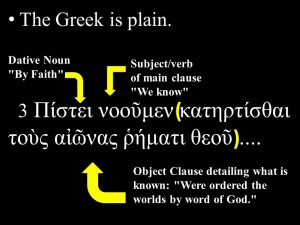
In a previous post, “What Makes a Pagan Pagan?: The Word Faith Heresy” I began discussing the two foundational errors of heart and mind that feed the many errors of Word Faith teachers.
At the root of their corrupted fruit tree is a pagan vision of God that suggests that, through a proper application of spiritual disciplines, the worshiper is able to turn the power of God to fulfill the worshiper’s own desires in life. This is presented, of course, as God’s highest end; His perfect will is our perfect “suffering-free-every-desire-of-our-heart-granted” existence in the here and now.
This idea even begins in pagan community with the “New Thought” teachings of Phineas Parkhurst Quimby (1802-1866). Quimby, a mentalist and mesmerist influenced by Franz Mesmer (1734-1815) impacted many religious communities like Christian Science and Universalists, as well as men like Napoleon Hill. These influenced E. W. Kenyon who encountered Quimby’s ideas while studying acting under a Universalist minister. Kenneth Hagin plagiarized much of Kenyon’s work in declaring himself and not Kenyon as the founder of the Word Faith Movement. from there it spread to figures like Kenneth Copeland, Robert Tilton, Marilyn Hickey, Benny Hinn, and several others. (A short history can be found in Hank Hanagraff’s two part article, “What’s Wrong with the Word Faith Movement.” (A)
Today, I’d like to consider the second idea that sits at the root of this corrupted tree.
The key term for these preachers, as one might guess by their nomenclature is FAITH. Faith to many Word Faith teachers is a power independent of God, the controlling force of what makes God able to do what God does. Copeland writes in his 2018 Christmas Partner letter, “You’ve heard me say before that spiritual forces are the most powerful forces in existence: faith—fear, love—hate, life—death, BLESSING—cursing. These are far more powerful than intellectual forces and certainly more than physical power. The spiritual force of faith created all matter.” (12.Partner-Letter-Dec_2018.pdf)
Fundamental to this most dangerous and atrocious idea, is their common interpretation (or should I say ignorant and malicious butchery) of Hebrews 11:1-3.
Their first error comes in Hebrews 11:1 by misunderstanding the KJV translation of “Faith is the substance of things hoped for the evidence of things not seen.” The use of “substance” is misleading today. The better translation for our modern American audiences is found in other translations like the ESV and NASB’s rendering “Now faith is the assurance of things hoped for, the conviction of things not seen.” Even the NIV is better, saying, “Now faith is confidence in what we hope for and assurance about what we do not see.” Faith is confidence and assurance based on trust in the source of the hope.
It gets worse in Hebrews 11:3. Here are three renditions. Wave a magic wand over the Scripture reference above and you can see a fourth.
- By faith we understand that the worlds were prepared by the word of God, so that what is seen was not made out of things which are visible. (NASB)
- By faith we understand that the universe was formed at God’s command, so that what is seen was not made out of what was visible. (NIV)
- Through faith we understand that the worlds were framed by the word of God, so that things which are seen were not made of things which do appear. (KJV)
Wow… This proves it. Faith really IS a power that God used to create the world and presently uses to sustain it. How could I have been so blind. (cough, splutter, wheeze)
They read it thus, “We understand that it was by faith that the worlds were prepared by the word of God, so that what is seen was not made out of things which are visible.”
They take the opening prepositional phrase (by faith) and attach it to (were prepared) in the object clause rather than to (We believe) in the main sentence which “in faith leads”.
The question is, “Is this possible?” There are four possible answers.
No.
Never.
Absolutely not.
Not even remotely possible. Not by English grammar rules and not by Greek Grammar rules.
So, while this is such a ridiculous reading that should not need to be argued, that would be laughable if the consequences of their error were not so grievous, I will try to prove it to you.
In the Greek sentence, the opening modifying term, an instrumental dative, sits on one side of the subject and main verb of the sentence; the object clause which details the substance of our understanding sits cohesively on the other side of the subject and main verb of the sentence. (See Figure)
While a Greek sentence might rearrange itself more easily than an English sentence because of case endings on nouns and adjectives,[1] clauses & modifiers still stick together. There is no way that a modifier for the verb in the object clause would be disconnected from the object clause by the subject and verb of the main clause. This is not only a blunder in Greek (which these teachers do not know and refuse to learn) but it is also a blatant mishandling of the English grammar which translators have carefully constructed to reflect the Greek.
Next, we might also note that verse 3 is only one of 16 of these introductory “by faith” intros in Hebrews 11, all of which are modifying the immediate actions of the following subject… none of which are treated so poorly by these same teachers.
The faith being praised by this chapter (and every other chapter in Scripture to boot) is clearly defined by the context. The words associated with “faith” and “believe” are connected to the πίστ family of words in Greek. Faith is belief… nothing more. They can reference: The act of believing, the content of belief, or a system of belief.
The opening of the chapter defines faith for us. “Now faith is the assurance of things hoped for, the conviction of things not seen.” (Hebrews 11:1)
But does any faith, any belief count? Is faith itself the thing to be praised? Do we merely have faith in faith?
Hebrews 11:2 further defines the nature of this faith. “For by it the men of old gained approval.” Hebrews 11:3ff defines it in action… detailing 16 times what particular men of old did in faith.
It is faith in God & faith in God’s word that has power, because God has power to do what He wills and the consistency of Character to be trusted completely.
So says, Hebrews 11:6 “And without faith it is impossible to please Him, for he who comes to God must believe that He is and that He is a rewarder of those who seek Him.”
The strength of a person’s faith is not solely measured in the degree to which one believes something, but also in the validity of that belief. One’s faith does not make something true, it creates nothing, accomplishes nothing, validates nothing.
What one’s faith does do is permit a person to act as if something is certain even when absolute evidence is lacking. Faith allows us to risk, to hope, to suffer through, to sacrifice, to act—and doing so, we are approved of by God, rewarded by God.
Jesus said, to the woman healed of the issue of blood in Mark 5:34 “Your faith has made you well.” Did faith heal the woman? Yes & No.
The text clearly says that what healed the woman was when a “proceeding power went out” from Jesus. Her faith, however, got her up, sent her seeking, made her risk.[2] She believed in Jesus, thus, risked, touched, was approved by God, rewarded by God.
Read the list in Hebrews 11. Pay attention to the work of God in and through these heroes of faith. Many glorious acts, yes… but much suffering as well. Their faith did not dispel suffering, did not grant them their hearts desires every time, did not protect them from blindness, lameness, loss or sorrow. Their faith enabled them to face suffering with a purpose, to trust in the God whose sovereign hand brought them through, not around, such common miseries.
And what do Word Faith teachers do with all this suffering? They wipe it away with a twist of the ending… “And all these, having gained approval through their faith, did not receive what was promised, because God had provided something better for us…”
“Better for us” means to them that we don’t have to suffer any more, or be sick anymore, or poor anymore… it’s all sunshine and lollypops for those who have faith.
Destructive fools.
[1] Case endings are special spelling patterns on nouns and adjectives that designate their function in the sentence. i.e. subject, direct object, indirect object, possessive, etc.
[2] (There is a lot of discussion to be had about the nature of her action in grabbing Jesus’ garment, which emphasizes the woman’s convictions about Jesus, the specifics of her faith in Him, but that is for another day.)
(A) (https://www.equip.org/articles/whats-wrong-with-the-word-faith-movement-part-one/, & https://www.equip.org/articles/whats-wrong-with-the-word-faith-movement-part-two/)
Discover more from Biblical Literacy with Dr. Andrew D. Sargent
Subscribe to get the latest posts sent to your email.

